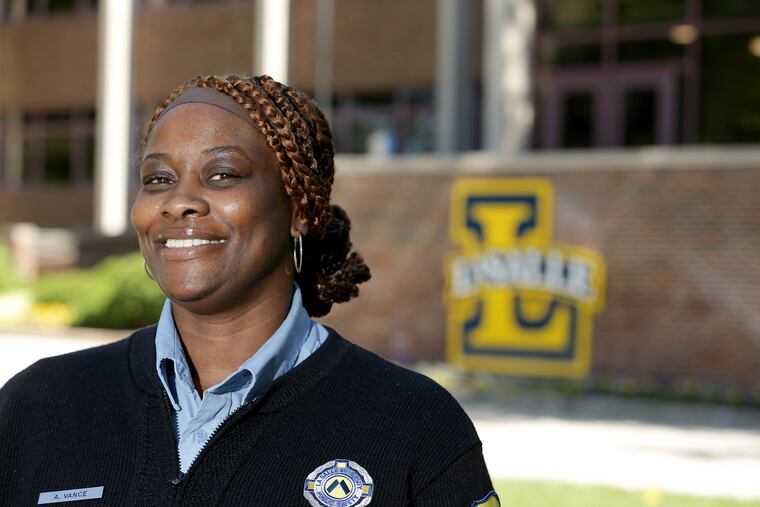For adult students, the journey to a degree can be long — and rewarding
More than 7 million students 25 years or older attend the nation’s colleges. Many of them, in addition to their course work, must juggle full-time jobs and raising children.

For 13 years, Aliya Vance has worked as a public safety officer and dispatcher at La Salle University with what’s been a lifelong mission: helping others.
Now, she has another La Salle title, too: graduate.
Vance, a native of Philadelphia, received her bachelor’s in social work last month. She donned her cap and gown and watched commencement virtually, like other graduates.
“It was still emotional,” said Vance, 45. “I made it!”
Vance is among 7.4 million students 25 years or older attending the nation’s colleges, about 37% of the nearly 20 million total, according to the National Center for Education Statistics. Many of them, in addition to their course work, must juggle full-time jobs and raising children.
That burden has become even more challenging during the COVID-19 pandemic. Some parents had to supervise school-age children taking classes online for the first time and deal with health and financial fallout of the virus.
But balance has always been an issue for adult students, and their resiliency has helped them to weather the pandemic well, said Christine Kelleher Palus, dean of Villanova University’s College of Professional Studies, which enrolls more than 200 adult students.
The adult student population could grow as larger numbers of unemployed seek new careers through education.
“We know that people are often motivated to seek out education during times of economic challenge,” Palus said. “I think this experience will be no different in that regard.”
» READ MORE: Death of a classmate, coronavirus, job loss: These CCP nursing grads have overcome a lot
Sometimes those whom adult students most hope to inspire are their own children.
“I didn’t want them to ever think it was too late to do anything,” Vance said.
Kellie Miles, who got her bachelor’s in interdisciplinary studies in leadership from Villanova in May, had similar motivations. In 2015, she watched her son struggling academically in high school and losing focus.
“It’s time for me to go back to school as an example for my son,” thought Miles, 40, of Phoenixville.
She wanted her son to see that if she could persevere in school while working full time in project management for an investment company and raising a family, he could make it through high school.
Years earlier, after graduating from high school in Philadelphia, she waited before enrolling in college. She started at Community College of Philadelphia in 1999 and again at Peirce College in 2002, stopping both times for family reasons. In 2015, she began again at Strayer, then transferred to Villanova a year later.
There were days she never went to bed, working until 4 a.m. to get class work done, she said.
“I had to continue to have that fight and that drive to say this time around, I’m going to finish,” she said. “I have to show my son that he, too, can do this.”
» READ MORE: Let the virtual graduations commence: Coronavirus has pushed ceremonies online
After the pandemic hit, the stress was greater, she said. She had to help her second-grader navigate online class, while her own class schedule became harder to manage, with professors wanting to have meetings during the work day.
“It’s really challenging, extra draining,” she said, “because when you’re home, you can’t go anywhere to get any relief.”
Now, she hopes to use her degree to build her women’s Christian club into a nonprofit business.
Her son, meanwhile, got through high school and attends Thaddeus Stevens College of Technology, a public technical school in Lancaster.
Vance, also a Philadelphia School District graduate who lives in the Northeast, became a single parent after high school. Over the years, she worked various jobs including as a commercial driver before landing the La Salle job in 2007.
Her job includes responding to emergencies, monitoring security cameras, and fielding calls for safety escorts and from parents who can’t reach their children and want a check conducted. Sometimes, her work means saving lives: Last year, a call came in about a food service worker who had collapsed. She dispatched officers, but rather than wait for an assessment, she immediately called 911, which proved critical. The employee recovered and a few of her professors who know the employee passed on a thank-you note.
Shortly after starting work at La Salle, she began taking classes, just one or two at a time in the evenings after work. Her tuition was covered by La Salle, a benefit of employment.
» READ MORE: A journey years in the making: Mom and daughter graduate from Penn together
Most classmates didn’t know she was an employee, she said. Some professors knew. There were times things were said in class about public safety after an incident, she said.
“To me, it was a benefit to know what we could do better,” she said.
Two years ago, her son, Kamil, now 25, got his bachelor’s in criminal justice at La Salle, the same year she got her associate’s in liberal arts. It was a highlight for both of them, she said.
She plans to pursue her master’s online at Rutgers and continue working at La Salle until she finds something in her field. The university has become like family, she said. Her favorite place on campus is the leafy quad with big chairs.
Vance writes poetry under the name Unique and self-published a book of her poems, Walk With Me, which is on the shelf at La Salle’s Connelly Library.
She hopes to become a licensed clinical social worker.
“I just have great empathy for people and their situations,” she said.
Until then, she’ll enjoy her dual role at La Salle: “I’m not just an employee. I’m an alumna!”